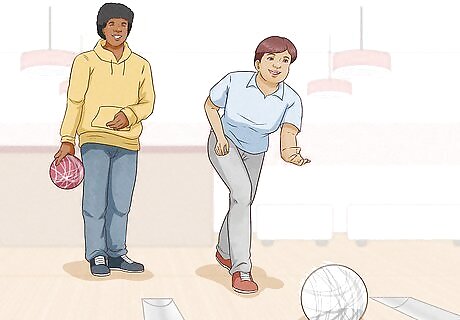
views
Building Trust

Follow through on the promises that you make. Always be reliable to your partner so they know they can trust you. Do your best to keep your word, and tell them immediately if something will prevent you from doing something you told them you’d do. For instance, be on time for date night and call when you say you will. Over the course of a relationship, you’ll likely encounter circumstances that make you break a promise. For instance, you might get a flat tire that makes you miss a date. Tell your partner what’s going so that you’re being open and honest with them.

Open up to your partner about your private thoughts. Shared intimacy is important in a relationship, so tell your partner about your inner life. This includes your feelings, worries, and dreams for the future. As an example, tell your partner when you're stressed over work. Say something like, "I'm really behind on my project, and I'm worried I won't meet the deadline." Similarly, talk to them about your dreams for the future. You might say, "I have a dream of opening an art bakery with my friend some day. She could bake the treats, and I could organize events to attract business."Tip: It’s important that your partner also open up to you. However, you can’t force them to tell you things. Just be there for them and encourage them to open up.

Don’t share your partner’s private information. You and your partner will share things with each other that no one else knows. When your partner opens up to you, keep it between yourselves. This shows your partner that they can trust you. For example, let’s say your partner tells you they’re angry at their brother over an argument. Don’t call the brother to tell him to apologize or post about the incident on social media.

Apologize when you make mistakes. You’re probably doing everything you can to be a good partner, but no one is perfect. When you make a mistake, fess up about what you did. Tell your partner that you’re sorry about what happened and how you’ll change in the future. You might say, “I know I stood you up tonight, and I’m so sorry. I forgot we had a date, but it won’t happen again because I’m going to put you on my calendar.”

Forgive your partner when they make a mistake. Sometimes your partner is going to mess up, but try to remember they’re not trying to hurt you. When this happens, tell them how their words or actions made you feel. Give them a chance to apologize and think about what they say. When you're ready, tell them that you forgive them and what you expect from them going forward. For example, let’s say your partner called you a rude name. You might say, “It hurts me that you’d call me that. I think it’s wrong to treat someone that way.” After they apologize, say, "I accept your apology and forgive you. In the future, I want us to avoid name calling during fights."

Support your partner when they encounter setbacks. Your partner is going to have rough moments. When this happens, be empathetic with them and offer your love and support. Additionally, encourage them to keep going. As an example, let’s say your partner misses out on a promotion. Tell them that you’re still proud of them and know they’ll get more opportunities in the future. Say, “I’m so proud that you pursued this opportunity. It might not have been the right fit for you, but I know you’re going to find something better in the future.”
Communicating with Your Partner

Talk about your relationship so that you're both on the same page. Make a habit of talking about how you feel about your relationship. Encourage your partner to open up to you, as well. This will help you both understand where you're both at in the relationship so you can build a strong future together. For instance, discuss your goals for your relationship, such as moving in together, getting married, or having kids. Additionally, talk about how you're both feeling in the relationship. You might say, "I feel like we're in a really good place right now. How about you?"

Listen to your partner and consider their side. Do your best to really focus on what your partner is saying. When they speak, listen closely to their words, then paraphrase what they said back to them. Think about their side of things before you respond. You might say, “It sounds like you’re upset that I forgot to do the dishes last night.”

Watch their nonverbal signals to understand them better. Your partner’s facial expressions and body language can tell you a lot about how they feel. Pay attention to your partner when you’re spending time with them so you better understand what they’re saying. Here are some things to consider: If they’re smiling a lot, they might feel happy about the situation. If their arms are spread open and they’re facing you, they’re probably open to talking to you. If they fold their arms over their chest, it might mean that they’re feeling closed off or defensive. Avoiding eye contact might mean they’re having trouble talking to you or that they’re hiding something. Turning away from you might mean that they’re upset or closed off. Raising their voice could mean that they’re escalating the situation, but it might mean that they’re not feeling heard.

Don’t bring up the past when you’re having disagreements. You might feel tempted to bring up past problems or slights during a fight to gain the upper hand. It’s normal to feel this way, but it won’t help your relationship. Focus on what’s happening in the present, and leave the past behind you. For instance, let’s say you’re upset that your partner came home later than expected. Don’t say, “You’re not reliable. It’s just like last week when you forgot to pay the phone bill.”

Express your appreciation for your partner daily. Tell your partner what you value about them every day. Give them compliments, and thank them for the kind things they do for you. This helps you not take them for granted. Say things like, “I love how creative you are,” “I’m so happy I have you to cuddle,” “You’re so smart and kind,” and “Thank you for being there for me today.”

Compromise when you have a disagreement. Every couple has issues, so you’re going to have disagreements. When this happens, talk about the issue so you both feel heard. Then, try to reach a compromise that works for both of you. As an example, let’s say one of you wants to save money for a new TV, but the other person wants to take a vacation. You might compromise by taking a weekend road trip and waiting a little longer to get your TV. Similarly, you might both want to spend the holidays with your respective families. You might compromise by switching off which family you see on the actual holiday each year so you each get equal time with your families.
Spending Time Together

Celebrate your special dates and anniversaries. Create personal holiday traditions that you can share with each other. Additionally, do something special for your birthdays and anniversary. This will bring you closer together and allow you to have fun together. As an example, start a Christmas Eve tradition of drinking cocoa while you look a Christmas lights. Bake each other cakes for your birthdays. Make plans for your anniversary every year.

Schedule “date nights” to keep the spark alive. It’s important to spend quality time with your partner so you feel close to them. To keep your bond strong, plan a date night at least once a week. Do something special for your date night, like going to dinner, bowling, or playing a board game at home. Work with your partner to find a day each week that works for both you and your partner.Variation: If you’re in a long distance relationship, schedule weekly dates over video chat. You might eat a meal together, watch the same movie, or play a game together.

Do shared activities that help you connect emotionally. It’s fun to spend time watching TV together, but it’s important to also do activities that allow you to interact. Make a list of fun things that you both enjoy, then make a point to do them together. This will help you grow closer together and maintain a close bond. For example, play mini golf, go for a hike, go camping, make a meal together, or go out for drinks.

Be physically affectionate with your partner. Build your intimacy by holding hands, hugging, kissing, cuddling, and being intimate. Talk to your partner about your intimacy needs, and ask them to tell you about theirs. Do your best to meet your partner’s desire for affection. For instance, kiss your partner in the morning and before bed. If you don’t live together, kiss them when you say hello and goodbye. When you’re together, touch your partner’s arms, back, and leg to show affection.

















Comments
0 comment